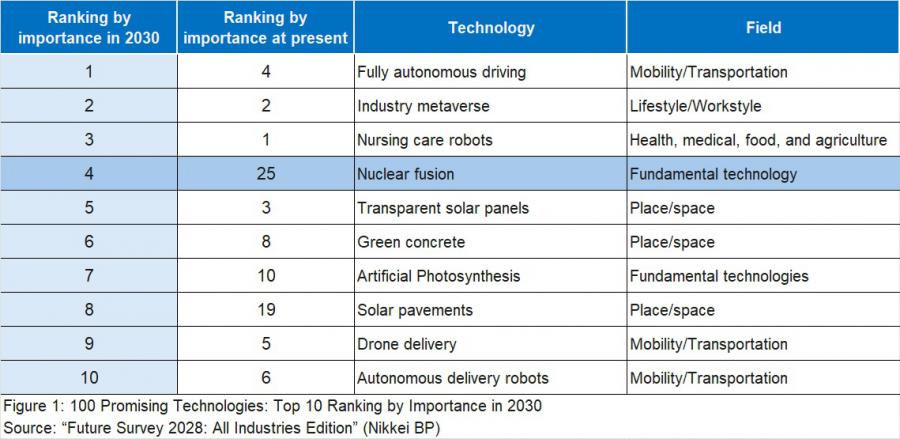
Nikkei BP survey highlights fully autonomous driving as the most important technology in 2030
Business people say fully autonomous driving will be the most important technology in 2030; nuclear fusion ranks 4th
TOKYO, JAPAN, June 19, 2024 /EINPresswire.com/ -- The future, as envisioned by business professionals, is undergoing significant changes. According to an ongoing large-scale survey project, the Five-Year Forward Survey, conducted by the Nikkei BP Intelligence Group, the top-ranked essential technology in 2030 is currently seen to be fully autonomous driving. Despite the amount of discussion surrounding AI, artificial intelligence-related technologies rated relatively low in importance in the survey*.
Figure 1 shows the top 10 promising technologies for 2030 based on the "Five-Year Forward Survey: Promising Technologies (2023 edition)" conducted in June 2023 by the Nikkei BP Intelligence Group. Fully autonomous driving ranked first, followed by the industry metaverse, in second place. Nursing care robots came in third place, nuclear fusion in fourth place, and transparent solar panels fifth.
The survey questionnaire listed 100 promising technologies and services that may change the world in the future*1. The list was compiled based on insights accumulated through research and interviews conducted by Nikkei BP journalists and Nikkei BP Intelligence Group researchers. The 100 technologies and services were categorized into seven fields: health, medical, food, and agriculture; mobility and transportation; place and space; lifestyle and workstyle; IT and communications; fundamental technologies; and artificial intelligence.
Around 800 business professionals from various job categories and industries who are interested in new technologies took part in the survey (Fig. 2). The largest group of respondents worked in technology, development and design. The survey asked respondents how they expected the significance and proliferation of 100 technologies to have changed by 2030 compared to now (the time of the survey.) The number of technologies and services listed in each of the seven fields was as follows: 15 in health, medical, food, and agriculture, as well as in IT and communications, and 14 each in mobility and transportation, place and space, lifestyle and workstyle, fundamental technologies, and artificial intelligence.
In the survey, respondents were asked to select up to three technologies in each of the seven fields that they believe are "important at present" and will be "important in 2030" in terms of growing existing businesses and generating new businesses. They were then asked to indicate how they expected the three technologies they had chosen to be used now and in the future. For this they were given the following options: research and development (preparation for commercialization), practical application (used by some people as a product or service), popularization (used by many people), or don't know/not applicable.
Based on the results, the percentage of technologies selected as "technologies that are currently important" and "technologies that may be important in 2030" were evaluated for their current importance and their projected importance in 2030, respectively. The higher the value shown, the higher the perceived importance.
Looking forward 10 years, nuclear fusion rapidly increases in importance, while expectations for AI-related technologies are low
As shown in figure 1, among the top 10 technologies, nuclear fusion is expected to become the fourth most important technology by 2030, a significant rise from its current importance ranking at 25th place. High expectations surround this technology's potential to address our energy challenges despite the high barriers to its realization. Several start-up companies in the United States are actively pursuing development projects with the goal of putting this technology into practical use, and there is a belief that this could be achieved as early as 2030.
When considering the top 20 technologies by field, mobility and transportation was the most frequently mentioned, with five technologies in this field ranking in the top 10. This suggests that there is significant optimism for technologies in this field to address labor shortages in logistics and public transportation, both of which are essential to society. While other fields were also well represented, the only technology in the artificial intelligence field to make it into the top 20 was "countermeasures against deep fakes," which came 16th.
Source:
*1 Nikkei Technology Forecast 2024: 100 Technologies to Change the World, edited by Nikkei BP, Nikkei Business Publications, September 2023
*This article is based on "Chapter 8: Technology and Services" from the "Future Survey 2028: All Industries Edition," a business report for companies. The report analyzes future scenarios for over 120 themes and industries based on the results of the Five-Year Forward Survey.
This article was written by Fumitada Takahashi, Future Business Research Team, Nikkei BP Intelligence Group.
For further details, please contact:
Nikkei Business Publications, Inc.
Public Relations Office
Nikkei.Inc
pr@nex.nikkei.co.jp
EIN Presswire does not exercise editorial control over third-party content provided, uploaded, published, or distributed by users of EIN Presswire. We are a distributor, not a publisher, of 3rd party content. Such content may contain the views, opinions, statements, offers, and other material of the respective users, suppliers, participants, or authors.



